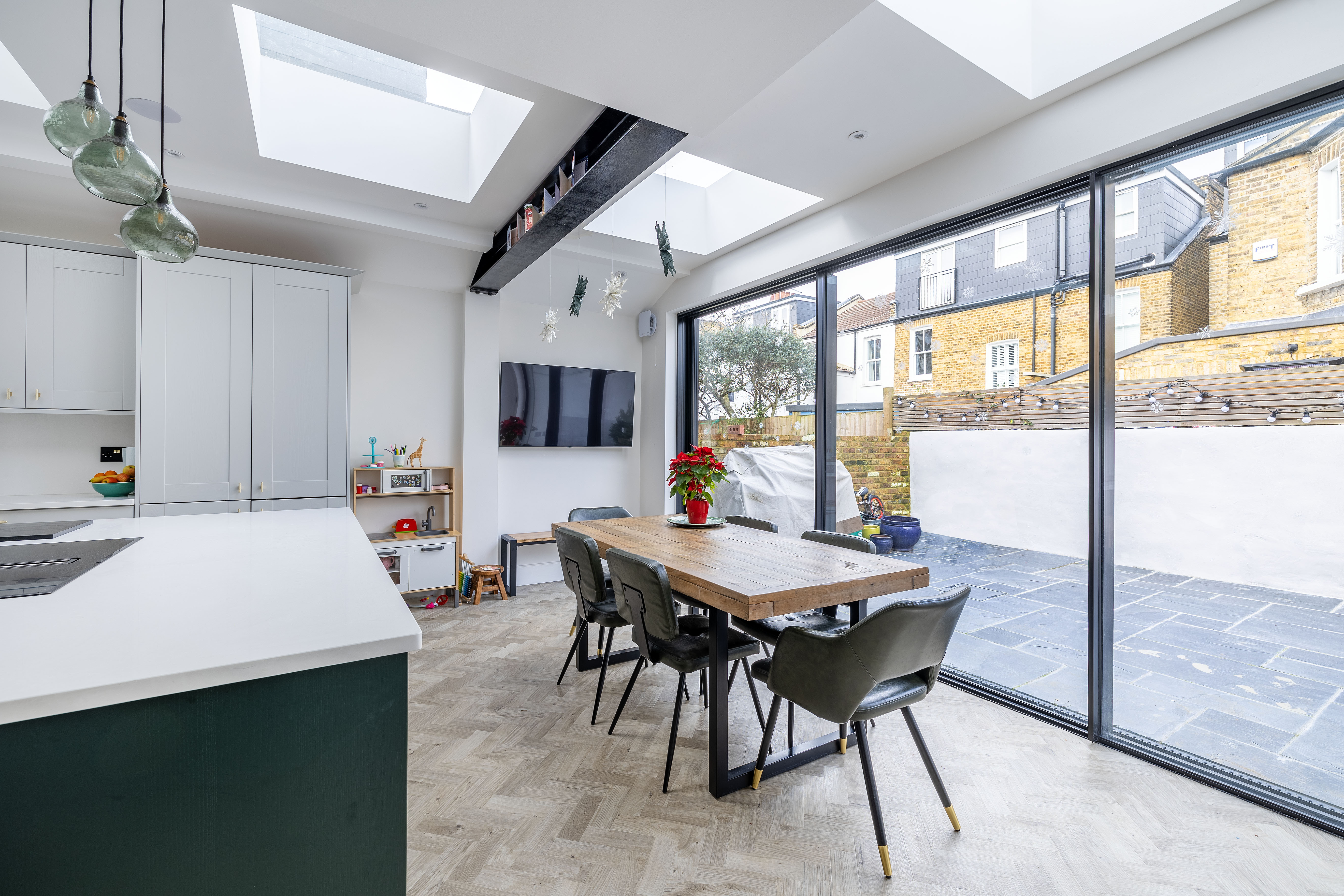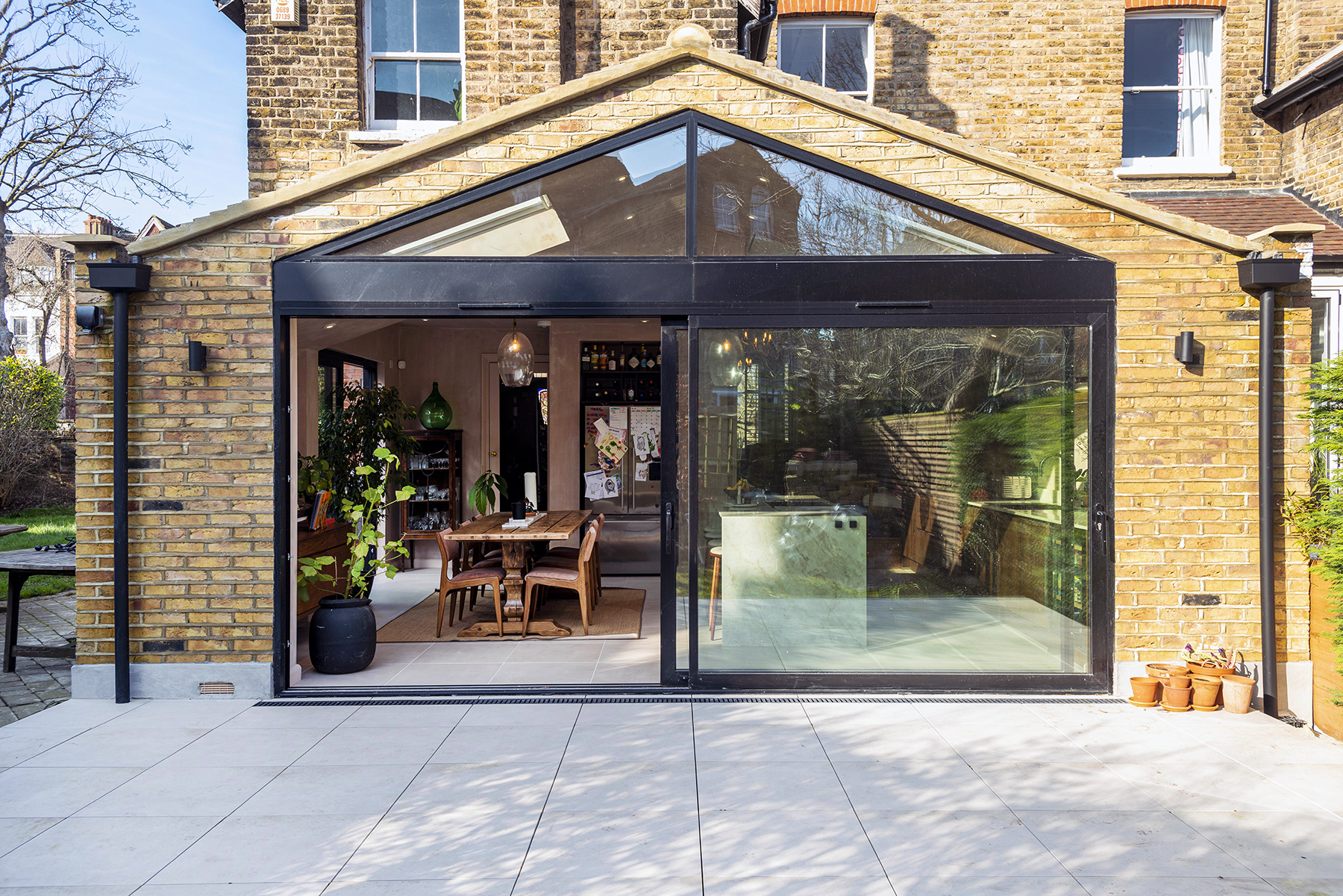Cost-Effective Ways to Finance Your Extension Project
- 08-11-23
- 5 min read
- Blog
There’s a lot of planning to consider towards a home extension project, and that, of course, includes financing the project.
Extensions should be viewed as an investment, and they can be a shrewd financial move in the long run, as the uplift in property value can often outstrip the initial outlay.
This is particularly the case in areas where space is at a premium, which is the case across many UK cities.
Here, we investigate some of the most cost-effective methods for financing your home extension project.
First off, let’s explore remortgaging, which is the go-to option for people who have built up some equity in their homes.
In short, remortgaging is a popular financing option among homeowners who wish to fund their home extensions by releasing equity from their property.
Remortgaging involves replacing your existing mortgage with a new one, which can be with your current lender or a new one. This approach releases the equity from your home, therefore providing funds for your extension.
Basically, you're leveraging the increased value of your home to obtain funds. If your home's market value has risen, remortgaging allows you to convert this increased value into cash to finance your expansion.
This could help you unlock even more value from your property via the extension.
Advantages of Remortgaging
An extension could potentially raise your home’s value by 10 to 20% or even higher in some scenarios.
Reports by financial analysts such as those from Zopa and USwitch have shown that, in the long term, the increase in equity from an extension often surpasses the initial expenditure.
This is particularly true when an additional bedroom can shift your property into a higher price category. Loft conversions, perhaps surprisingly, offer the highest return on investment (ROI) of any type of home renovation project, according to some studies.
This is partly because they’re an ultra-efficient means of adding an extra bedroom to a property, sometimes without major structural modifications.
The perks of remortgaging encompass:
Lower interest rates: You might be able to secure a lower rate through remortgage, leading to substantial savings over the mortgage term. However, the opposite could also be true.
Extra borrowing capacity: Instead of depleting savings or incurring high-interest debt, remortgaging can provide the funds needed for your extension from equity in your property.
Debt consolidation: Remortgaging might offer the opportunity to amalgamate other debts into a single payment with lower interest, streamlining your finances.
Evaluating the Decision to Remortgage
When considering expanding your house, remortgage is a tempting option if your personal funds are insufficient.
However, before proceeding, it's critical to ascertain if remortgaging is the best path, as there are alternatives.
Consider the following before deciding to remortgage:
Return on investment: Analyse the potential uplift in your property's value against the cost of the extension, considering advice from real estate professionals and mortgage brokers.
Equity retention: Ensure that after remortgaging, a healthy level of equity remains in your home to safeguard against market fluctuations.
Affordability of increased loan: Understand the implications of a larger loan on your monthly finances and long-term financial stability.
Determining Your Home’s Equity for Remortgaging
Equity is key in remortgaging, representing the market value of your property minus your outstanding mortgage balance.
To assess your equity, follow these steps:
Get an up-to-date valuation of your home.
Find out the current balance of your mortgage.
Deduct the mortgage balance from your home’s market value to establish available equity.
Keep in mind that lenders often require you to maintain a certain percentage of equity after borrowing.
Finding the Best Remortgage Deal
Having determined your equity, you can seek out the most advantageous remortgage deal by considering:
Interest rates and APR
Fixed versus variable rates
The length of the mortgage term
Fees charged by lenders
Potential early repayment penalties
Working with an independent mortgage advisor or broker is highly recommended to navigate these options, particularly if you aim to release a substantial amount of equity.
Not everyone has built up equity in their properties. Additionally, remortgaging is more complex than other financing methods despite being ideal for those whose properties are worth more than when they bought them.
As an alternative to remortgaging, you can consider a secured home improvement loan. By ‘secured,’ the loan is secured against your property.
It’s easiest to understand secured home improvement loans compared to remortgaging, as they’re somewhat similar.
Here are some scenarios when you might consider a secured home improvement loan:
There are distinct circumstances where a secured loan might be a more advantageous choice compared to remortgaging. Here's when to consider it:
Preserving a Low Mortgage Rate: If your current mortgage benefits from a particularly low-interest rate that would increase upon remortgaging, holding onto your mortgage and opting for a secured loan, even at a slightly higher rate, might be financially prudent.
During Fixed-Rate Periods: Should you be amid a fixed-rate mortgage term, remortgaging could entail substantial exit fees. A secured loan may be a less costly option, provided you've crunched the numbers carefully or sought advice from a mortgage broker.
Speed of Funds: Secured loans can often be processed more quickly than a remortgage. If your financial need is urgent, the same-day access to funds that secured loans sometimes offer could be crucial, in contrast to the potentially weeks-long remortgage process.
Navigating Exceptional Circumstances: For those with non-standard financial histories – like self-employment, a dip in credit score, or past CCJs or bankruptcies – a secured loan could be more accessible. Lenders often have more lenient criteria for secured loans in these situations.
Post-Mortgage Financing: If you have already fully paid off your mortgage, raising extra funds through your property can be tricky. Most lenders are hesitant to remortgage a fully paid property, but a secured loan could provide a viable path to leveraging your home’s equity for additional finances.
You can also secure a standard loan, which is simple and doesn’t carry the same risk as a secured loan.
However, the higher risk to the lender and lack of collateral means that these loans inherently carry more risk for the lender and thus come with higher interest rates.
These loans are often more suitable for smaller-scale projects or as part of a broader financing mix.
For example, if you're looking at a moderate renovation of £20,000, an unsecured loan could potentially fund the entire project, but for larger extensions costing upwards of £50,000, it may only cover a portion of the expenses.
There are other funding options besides the three discussed here, such as borrowing using 0% credit cards. Read our article here for further information on credit card financing.
Here are three simplified case studies to demonstrate home extension financing.
Some important notes:
These examples are illustrative and based on the rates provided. Actual rates may vary based on personal circumstances.
The APRC (Annual Percentage Rate of Charge) represents the cost of borrowing on an annual basis and includes interest as well as any other charges associated with the loan.
A mortgage or secured loan is secured against the borrower's home, meaning the lender can repossess the property if repayments are not maintained.
The total cost of the loan includes interest payments and any associated fees, like booking or solicitor's fees.
Overpayments can often be made on loans and mortgages, typically up to 10% of the outstanding balance per year without incurring early repayment charges, but terms can vary.
Borrowers should consider both the monthly repayment affordability and the long-term interest implications when selecting a financing option for home improvements.
As financial situations and offers can change, it’s crucial to check the latest rates and terms before deciding.
In any of these cases, the extension might increase property value in either the short or long term, which can help negate interest or yield a profit from the eventual sale of the house. However, this can never be guaranteed.

Above: Ground floor extension from Build Team.
Jennifer is planning to expand her kitchen, and the estimated project cost is £25,000. She takes out a personal loan, which typically does not require her home as collateral.
Assuming she has a good credit history, she might find a personal loan with an APR of around 7.5% for a 5-year term.
This would mean her monthly repayments would be approximately £500, resulting in a total repayment of £30,000 over the life of the loan.

Above: Loft conversion in SE13 from Build Team.
Mark and Alex are considering a loft conversion estimated to cost £45,000. They decide to remortgage their home to free up the equity they need.
With a 70% LTV, they might find a 5-year fixed-rate remortgage deal around 5% APR. On their outstanding mortgage of £200,000, adding the cost of the loft conversion would result in a new loan of £245,000.
Their monthly repayments would increase, and over the 5-year fixed-rate period, they would pay a total of around £13,890 in interest for the additional borrowing.
After the fixed period, the rate might revert to the lender's standard variable rate, which could be around 6.99% or higher, affecting subsequent repayments.

Above: Beautiful extension in E17 by Build Team.
Sophie and Chen want to add a two-storey extension to their house, requiring £60,000 for the project.
They decide to take a secured loan against their home equity. They might get an offer with a 70% LTV and a 3-year fixed interest rate at 5.29% APR.
Over a 10-year term, their monthly repayments would be around £643, and they would pay approximately £17,160 in interest over the 3-year fixed-rate period.
After this period, the rate would likely adjust to the current variable rate, which could increase their future repayments.
Financing a home extension project involves careful planning, but with careful planning and research, you can find the most suitable method for your specific needs.
Remortgaging and home improvement loans are two credible options that offer flexibility and financial support, enabling you to bring your dream home extension to life. Unsecured loans and credit cards can keep things nice and simple for smaller projects.
By considering the advantages and potential costs of each option, as well as understanding the application process, you'll be well-equipped to make an informed decision and embark on your home improvement journey.
Design Team has a wealth of experience in designing home extension projects and building them through Build Team. Book a free consultation with us today to learn more about how we can help you.
Book a free Design Consultation with one of our team to discuss your project in more detail.
.jpg)
11-11-24 6

10-11-24 6

25-10-24 6